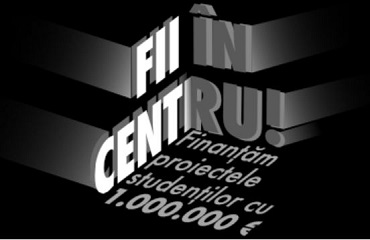Over 550,000 euros invested by Transilvania University in student projects
Now in its third edition, “Be Central” competition, initiated by Transilvania University of Brașov, appreciates 10 projects developed by the students, which are already implemented within the institution.
Specifically, the UNITBV students submitted, in late 2020, several project proposals aimed at improving both the teaching and the administrative activities conducted by our students, teaching personnel or administrative staff. Out of the 50 projects submitted last year, 10 ideas were selected to add value to our University.
After a rigorous analysis of the proposals, the University purchased the necessary equipment, and the students set to work. Overall, the acquisition costs amounted to almost 350,000 euros. In addition, part of the money was also allocated to the scholarships that the students received as a reward for their work. The scholarships represented a maximum of 30% of the total value of the project, so that a scholarship even reached 8,000 euros for a student. Overall, more than 220,000 euros were allocated to reward students. Over 60 students were involved in implementing the projects.
What projects did the students develop?
· RoboCovCleaner – the three students of the project team made an independent robot that can be controlled and programmed remotely through an application to disinfect the halls and classrooms in the university buildings. The robot currently fulfills its task in the V building where, by means of the UV lamps, it disinfects the rooms.
· Safe-Unitbv – the six students who proposed this project developed a system for checking the body temperature and the wear of a protective mask, but also systems for checking the 1.5-meter physical distance between people, as well as air quality monitoring systems. The devices are currently located and operational in the University’s Research and Development Institute.
· Intuit@Unitbv – three students created new functionalities of the University’s intranet platform (with various applications for scheduling exams or filing complaints), designed a virtual tour of the buildings, and installed 3 info-kiosks synchronizing with the website unitbv.ro and automatically taking over announcements, news and events for display. In this way, the information reaches the students more easily and quickly.
· Cards@Unitbv– the three students of the project made a system of virtual cards, so that each student will have a single card (on the phone) with which s/he will have access to the library, will enter the dormitory or will keep track of his/her attendance at sports classes.
· Package of applications for streamlining the IT process – the project team developed an application for designing the schedule so as to streamline the process, and so that no overlaps or errors occur. Moreover, it brought new features to the University’s mobile app.
· Vizual Life – the team involved in this project turned classical teaching materials and tools into educational resources suitable for online communication such as: animated presentations of mechanisms / processes, videos themed on life sciences, interactive digital panels, exhibition panels, atlases.
· Med-Access – the team of students made interactive grids, radiological and ultrasound images explained for various pathologies, cardiological and pulmonary auscultations, videos in Romanian with different medical, recovery and laboratory techniques, which are useful for medical students. All this can be accessed from the University’s Elearning platform.
· First steps in simulated health education – within the project, the students made various tutorials on mannequins for simulating various medical and surgical manoeuvres; and, in this regard, they also purchased the mannequins needed for various medical exercises.
· DigiEdu – the students conducted various interviews with the directors of the research centres with whose help the activity was presented and the research projects were implemented.
· Detection and isolation of people infected with Covid-19 – within the project, the team developed a thermal scanning system based on artificial intelligence.
All these projects are already in use or are being implemented within the University. Depending on their results and usefulness over time, the University management considers extending these projects.



